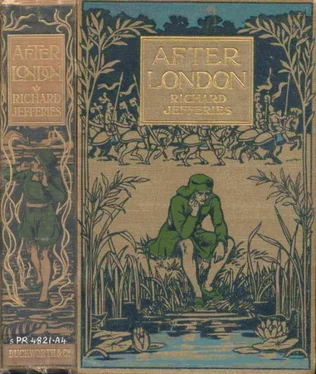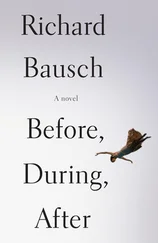Richard Jefferies - After London
Здесь есть возможность читать онлайн «Richard Jefferies - After London» весь текст электронной книги совершенно бесплатно (целиком полную версию без сокращений). В некоторых случаях можно слушать аудио, скачать через торрент в формате fb2 и присутствует краткое содержание. Город: London, Год выпуска: 1905, Издательство: Duckworth & Co., Жанр: sf_postapocalyptic, на английском языке. Описание произведения, (предисловие) а так же отзывы посетителей доступны на портале библиотеки ЛибКат.
- Название:After London
- Автор:
- Издательство:Duckworth & Co.
- Жанр:
- Год:1905
- Город:London
- ISBN:нет данных
- Рейтинг книги:4 / 5. Голосов: 1
-
Избранное:Добавить в избранное
- Отзывы:
-
Ваша оценка:
- 80
- 1
- 2
- 3
- 4
- 5
After London: краткое содержание, описание и аннотация
Предлагаем к чтению аннотацию, описание, краткое содержание или предисловие (зависит от того, что написал сам автор книги «After London»). Если вы не нашли необходимую информацию о книге — напишите в комментариях, мы постараемся отыскать её.
(1885), set in a future in which urban civilization has collapsed after an environmental crisis.” (From
).
This eBook is for the use of anyone anywhere at no cost and with almost no restrictions whatsoever. You may copy it, give it away or re-use it under the terms of the Project Gutenberg License included with this eBook or online at
* * *
After London — читать онлайн бесплатно полную книгу (весь текст) целиком
Ниже представлен текст книги, разбитый по страницам. Система сохранения места последней прочитанной страницы, позволяет с удобством читать онлайн бесплатно книгу «After London», без необходимости каждый раз заново искать на чём Вы остановились. Поставьте закладку, и сможете в любой момент перейти на страницу, на которой закончили чтение.
Интервал:
Закладка:
“I wish Sir Constans would insist on the guard being kept,” he remarked. Children, in speaking of their parents, invariably gave them their titles. Now their father’s title was properly “my lord,” as he was a baron, and one of the most ancient. But he had so long abnegated the exercise of his rights and privileges, sinking the noble in the mechanician, that men had forgotten the proper style in which they should address him. “Sir” was applied to all nobles, whether they possessed estates or not. The brothers were invariably addressed as Sir Felix or Sir Oliver. It marked, therefore, the low estimation in which the Baron was held when even his own sons spoke of him by that title.
Oliver, though a military man by profession, laughed at Felix’s strict view of the guards’ duties. Familiarity with danger, and natural carelessness, had rendered him contemptuous of it.
“There’s no risk,” said he, “that I can see. Who could attack us? The Bushmen would never dream of it; the Romany would be seen coming days beforehand; we are too far from the Lake for the pirates; and as we are not great people, as we might have been, we need dread no private enmity. Besides which, any assailants must pass the stockades first.”
“Quite true. Still I don’t like it; it is a loose way of doing things.”
Outside the gate they followed the waggon track, or South Road, for about half a mile. It crossed meadows parted by low hedges, and they remarked, as they went, on the shortness of the grass, which, for want of rain, was not nearly fit for mowing. Last year there had been a bad wheat crop; this year there was at present scarcely any grass. These matters were of the highest importance; peace or war, famine or plenty, might depend upon the weather of the next few months.
The meadows, besides being divided by the hedges, kept purposely cropped low, were surrounded, like all the cultivated lands, by high and strong stockades. Half a mile down the South Road they left the track, and following a footpath some few hundred yards, came to the pool where Oliver had bathed that morning. The river, which ran through the enclosed grounds, was very shallow, for they were near its source in the hills, but just there it widened, and filled a depression fifty or sixty yards across, which was deep enough for swimming. Beyond the pool the stream curved and left the enclosure; the stockade, or at least an open work of poles, was continued across it. This work permitted the stream to flow freely, but was sufficiently close to exclude any one who might attempt to enter by creeping up the bed of the river.
They crossed the river just above the pool by some stepping-stones, large blocks rolled in for the purpose, and approached the stockade. It was formed of small but entire trees, young elms, firs, or very thick ash-poles, driven in a double row into the earth, the first or inner row side by side, the outer row filling the interstices, and the whole bound together at the bottom by split willow woven in and out. This interweaving extended only about three feet up, and was intended first to bind the structure together, and secondly to exclude small animals which might creep in between the stakes. The reason it was not carried all up was that it should not afford a footing to human thieves desirous of climbing over.
The smooth poles by themselves afforded no notch or foothold for a Bushman’s naked foot. They rose nine or ten feet above the willow, so that the total height of the palisade was about twelve feet, and the tops of the stakes were sharpened. The construction of such palisades required great labour, and could be carried out only by those who could command the services of numbers of men, so that a small proprietor was impossible, unless within the walls of a town. This particular stockade was by no means an extensive one, in comparison with the estates of more prominent nobles.
The enclosure immediately surrounding the Old House was of an irregular oval shape, perhaps a mile long, and not quite three-quarters of a mile wide, the house being situated towards the northern and higher end of the oval. The river crossed it, entering on the west and leaving on the eastern side. The enclosure was for the greater part meadow and pasture, for here the cattle were kept, which supplied the house with milk, cheese, and butter, while others intended for slaughter were driven in here for the last months of fattening.
The horses in actual use for riding, or for the waggons, were also turned out here temporarily. There were two pens and rickyards within it, one beside the river, one farther down. The South Road ran almost down the centre, passing both rickyards, and leaving the stockade at the southern end by a gate, called the barrier. At the northern extremity of the oval the palisade passed within three hundred yards of the house, and there was another barrier, to which the road led from the Maple Gate, which has been mentioned. From thence it went across the hills to the town of Ponze. Thus, anyone approaching the Old House had first to pass the barrier and get inside the palisade.
At each barrier there was a cottage and a guard-room, though, as a matter of fact, the watch was kept in peaceful times even more carelessly than at the inner gates of the wall about the House itself. Much the same plan, with local variations, was pursued on the other estates of the province, though the stockade at the Old House was remarkable for the care and skill with which it had been constructed. Part of the duty of the watchman on the roof was to keep an eye on the barriers, which he could see from his elevated position.
In case of an incursion of gipsies, or any danger, the guard at the barrier was supposed to at once close the gate, blow a horn, and exhibit a flag. Upon hearing the horn or observing the flag, the warder on the roof raised the alarm, and assistance was sent. Such was the system, but as no attack had taken place for some years the discipline had grown lax.
After crossing on the stepping-stones Oliver and Felix were soon under the stockade which ran high above them, and was apparently as difficult to get out of as to get into. By the strict law of the estate, any person who left the stockade except by the public barrier rendered himself liable to the lash or imprisonment. Any person, even a retainer, endeavouring to enter from without by pole, ladder, or rope, might be killed with an arrow or dart, putting himself into the position of an outlaw. In practice, of course, this law was frequently evaded. It did not apply to the family of the owner.
Under some bushes by the palisade was a ladder of rope, the rungs, however, of wood. Putting his fishing-tackle and boar spear down, Oliver took the ladder and threw the end over the stockade. He then picked up a pole with a fork at the end from the bushes, left there, of course, for the purpose, and with the fork pushed the rungs over till the ladder was adjusted, half within and half without the palisade. It hung by the wooden rungs which caught the tops of the stakes. He then went up, and when at the top, leant over and drew up the outer part of the ladder one rung, which he put the inner side of the palisade, so that on transferring his weight to the outer side it might uphold him. Otherwise the ladder, when he got over the points of the stakes, must have slipped the distance between one rung and a second.
Having adjusted this, he got over, and Felix carrying up the spears and tackle handed them to him. Felix followed, and thus in three minutes they were on the outer side of the stockade. Originally the ground for twenty yards, all round outside the stockade, had been cleared of trees and bushes that they might not harbour vermin, or thorn-hogs, or facilitate the approach of human enemies. Part of the weekly work of the bailiffs was to walk round the entire circumference of the stockade to see that it was in order, and to have any bushes removed that began to grow up. As with other matters, however, in the lapse of time the bailiffs became remiss, and under the easy, and perhaps too merciful rule of Sir Constans, were not recalled to their duties with sufficient sharpness.
Читать дальшеИнтервал:
Закладка:
Похожие книги на «After London»
Представляем Вашему вниманию похожие книги на «After London» списком для выбора. Мы отобрали схожую по названию и смыслу литературу в надежде предоставить читателям больше вариантов отыскать новые, интересные, ещё непрочитанные произведения.
Обсуждение, отзывы о книге «After London» и просто собственные мнения читателей. Оставьте ваши комментарии, напишите, что Вы думаете о произведении, его смысле или главных героях. Укажите что конкретно понравилось, а что нет, и почему Вы так считаете.












